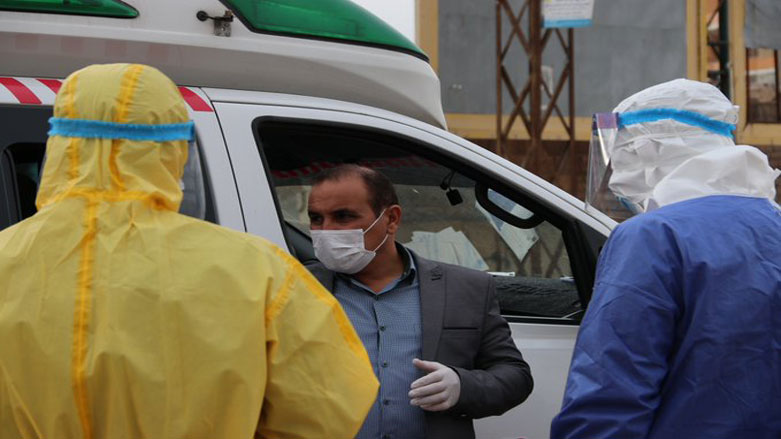QAMISHLI, Syria (Kurdistan 24) – The Kurdish-led self-administration in northeastern Syria on Wednesday criticized the Syrian regime for allowing several people to pass into administration territory without first being tested for the coronavirus.
In doing so, said Kurdish officials, Damascus bears responsibility for exposing hundreds of thousands of vulnerable civilians to outbreaks of the deadly disease.
“Syrian [regime] authorities are not cooperating with us, but rather endanger the people’s lives in north and east Syria by letting civilians cross into our areas without being quarantined and tested for coronavirus,” the Kurdish administration said in a statement.
“We hold the Syrian [regime] authorities responsible for any case of coronavirus in our region because of their recklessness by violating the preventive measures and passing passengers to our areas without informing us,” the self-administration statement reads.
According to international organizations and experts, the self-administration is poorly prepared to deal with the coronavirus crisis due to a fragile health system, already degraded and strained by almost a decade of civil war and large numbers of displaced civilians.
The Kurdish administration’s police and media offices have called upon people of the region to report any travellers coming to the border of areas under their control from the direction of Damascus without being subjected to anti-coronavirus health procedures.
Earlier this week, dozens of passengers coming from Damascus to regime-held Qamishli airport have been taken to quarantine by the Kurdish self-administration before being allowed to enter.
So far, there have been no reported cases of the virus in northern and northeastern Syria, also known as Rojava (Syrian Kurdistan) under the self-administration. The Syrian government’s Ministry of Health has reported a mere 19 cases, including two people who have recovered and another two who have died.
In the face of multiple reports to the contrary, it is widely believed that Damascus is significantly underreporting the incidents of coronavirus in the areas of the country that it controls.
Not long after it first emerged in China in late 2019, Iran became the epicenter of the coronavirus in the Middle East, and exporting it to multiple neighboring nations. Iran has considerable regional influence, in part because of its proxy militias in Syria, Iran, and Lebanon. The resulting presence of Iranians, including frequent travel from Tehran, is seen as a likely vehicle for the virus to be fanning out into all three nations’ populations.
Syrian Kurdish authorities have already taken precautionary measures to prevent the spread of the pandemic to their region, where the health system has been severely damaged and overtaxed by almost a decade of civil war.
The first move taken in late February was to close the Semalka border crossing, the main passenger conduit between Rojava and the Kurdistan Region of Iraq. Until then, it had long been the primary way in or out of Syrian Kurdish-controlled areas, used commonly by international journalists, humanitarian organizations, and diplomatic missions even if barred from operating in Syrian regime-held areas.
Local officials have also enacted and expanded curfews in areas under its jurisdiction. Since Feb. 26, the administration decided to restrict civilians recently in Europe from entering through the border crossing.
Despite such measures, the very real danger of a local coronavirus outbreak still exists and is exacerbated by the lax restrictions in regime-held territories that border the northeast, especially at checkpoints on the outskirts of Deir al-Zor, Raqqa, and Manbij provinces.
In the cities of Tabqa, located southwest of Raqqa, and in Manbij, those coming from regime and rebel areas are being checked by administration medical teams for symptoms consistent with the coronavirus before being permitted to enter the Kurdish-controlled areas. Additional mobile teams are also working to spread information about the virus and make recommendations aimed at curbing contagion.

